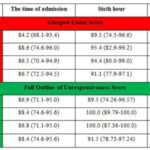Monthly Archives: April 2016
Assessing the outcome of multiple trauma patients based on their GCS and FOUR score coma scale
How hydrogen atoms bind to metal surfaces
A new drug target for healthful aging
MSX1 sensitises cells to ovarian cancer treatment
Which methodology should be used to evaluate adherence to topical treatment?
Intensification of phosphorus cycling in China
Phosphorus (P) is a critical and irreplaceable nutrient for life on earth. It plays an important role in the growth of cells, bones and teeth, and is a key component of molecules essential to metabolism. In old
Substituent-dependent reaction in mechanofluorochromism
From toxic wastes to valuable products: valorization of olive oil mill wastewater using mushrooms
28th conference of European Comparative Endocrinologists
A “TORgeted” way to heal the gut
Why drinking the Mediterranean way is healthier
A recent letter in the British Medical Journal suggests that how alcohol is consumed should be given more emphasis when advising on alcohol limits. The British government recently reduced its recommended limit to 14 units per week
Complications of deep anterior lamellar keratoplasty: Avoid, recognize and treat!
Can NSAIDs alter thyroid hormone function?
A better, safer clot buster for heart attacks, strokes and other cardiovascular diseases
A clot that obstructs blood flow triggers the onset of most heart attacks and 85% of strokes, the leading causes of death and disability worldwide. Reestablishing blood flow rapidly limits damage to the heart or brain, saves
Special molecular mechanism makes CD147 an interesting drug target in cancer or autoimmune diseases
Can we select best sperm?
Collateral damages and self-inflicted scars by inflammation in cardiovascular diseases
Who are the people waitiing to have talking therapies?
Improving Access to Psychological Therapies (IAPT) is a national programme across the England offering access to psychological therapies for people with depression and anxiety. These include cognitive behavioural therapy and other “talking therapies”. A way to monitor





















